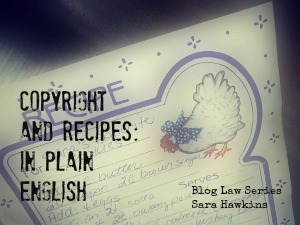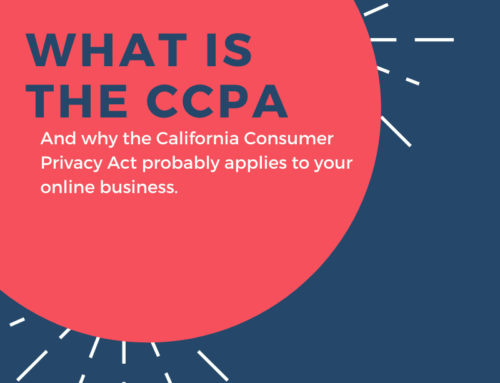Recipe Copyright Explained in Plain English
One of the most asked questions I get has to do with recipe copyright. It’s very upsetting for food bloggers to see their work copied verbatim. Unfortunately, unlike photos or images, all words don’t carry the same weight when it comes to copyright. Recipes are one of those areas where copyright law has a number of limitations and does not always cover a blogger’s hard work.
Certainly, there may be ethical issues issue when a recipe is copied and not given attribution. And plagiarism is often brought up when people see their recipe used without credit. But plagiarism is not illegal and not part of copyright law.
How do I protect my recipe from being copied?
Creating a meal is one thing. Write it down step by step, ingredient by ingredient is painstaking, tedious and not to mention time-consuming. So it’s no wonder that very few recipes are truly original. Most recipes have been adapted from family favorites, modified because you want to simplify the ingredients or method or re-created from a handful of similar recipe that you’ve taken the best from each.
Once the recipe is perfected, tested, and photographed nine-hundred and thirty-two times, you blog about it and post pictures and further bask in what surely will be loving and wonderful comments of your faithful readers. Then you hit publish and wait for the Google Alert to warn you that someone has just done their finest cut and paste job and posted your recipe on their blog. And because they are so genuinely nice they even gave you a ‘shout out’, which is how you know you’ve been loved on so nicely. Now what? (besides wanting to beat them with a wet homemade noodle)
Plagiarism? Copyright violation? Rogue food blogger? Whatever it is, you’re having none of it!
Plagiarism is not illegal. Unethical, sure. Preventable by law, no. Plagiarism is the unauthorized use of another’s work represented as your own. Being that there are no legal constructs for it with regard to your recipe you’re better off focusing your efforts on other theories. Your post, to some degree, is protected by copyright but the recipe itself may not be. And if they gave you a ‘shout out’ or somehow attributed that recipe to you then they’re not claiming it as their own and plagiarism will not apply.
Copyright sounds like it should apply. And it may, if the ingredient list AND its instructions are lifted verbatim or “substantially”. In general, US Copyright applies to original works of authorship fixed in a tangible medium. “Original” means that an author produced a work by his or her own intellectual effort instead of copying or modifying it from an existing work. “Fixed in a tangible medium” means that the work is able to be perceived, reproduced, or otherwise communicated. Your blog is the necessary ‘tangible medium’.
It goes without saying that a cookbook, like most other books, is an original work of authorship. It’s not the recipes, individually, that are protected. Although, if sufficiently original, the individual recipe may be protected. Instead, it is the book as a whole – not unlike anything on the NYT Bestseller list – that is protected. Each recipe, on its own, doesn’t hold much weight in the world of copyright. As you can well imagine, there are probably billions of recipes out there. And most could likely be traced back to some other recipe for its inspiration. Copyright will only protect the written work and would never prohibit someone from reading the recipe and making it.
So what do you do? If your recipe is up on someone else’s blog without any link to you or even the slightest passing reference, then there is at minimum a possibility to claim your work as being plagiarized. Depending on other factors, verbatim copying my give you other digital rights.
But what if it’s not verbatim? How much of it do they have to take? Is it truly an “original work of authorship” giving rise to copyright? What if you adapted a recipe (a derivative work, perhaps)? And then, what do you do?
You always have the ability to send a nice email thanking them for liking your recipe and asking for it to be removed or changed or asking for a link back or credit of some form. But what more can you do?
The best way to protect your recipe from being copied is not to share it. Seems counterintuitive, yes? But think of all those corporate recipes that are secrets such as Coke (although it appears even this may no longer be secret), Cinnabon, and Cheetos.
But the reality for many food bloggers is that your blog exists so you can share your recipes. Without the sharing you’d have no blog. It’s your passion. Not just the food but also the sharing.
What part of recipe is copyrightable?
Lists are not subject to copyright, per US Copyright Law. This is well-known to mean the ingredient listing is not protected. With recipes, it’s the instructions or directions that are potentially copyrightable so long as they meet the criteria of being an original work of authorship and substantial literary expression. So that recipe for your fabulous margarita probably doesn’t count as ‘substantial literary expression’ when the directions are something like put all ingredients in blender, blend on high for 3 minutes, pour into glass and enjoy. What you need is something more, well, substantial.
Why are recipes so unique?
Recipes are meant to be shared. It’s a long-standing tradition to pass along the recipe for a favorite dish. You’re flattered when someone wants your recipe. But when it impacts your profitability and your brand, it’s a completely different proposition. The line between acceptable copying and damage to your brand, though, is as thin as a cucumber slice on your mandolin.
Attribution
Where did the recipe come from? Was this something you learned to make with your nana? Or did you happen to see it on Epicurious or Food Network? Maybe you read it in a magazine and you’re tweaking it because your family doesn’t like one of the ingredients (again, possibly a derivative work)?
As with anything we permissively take from another source, it should be accompanied by some form of attribution. Minimally, a mention. Preferably a link, even if it’s just to the home page.
What to do if your recipe is on another site without permission?
As with most other situations of blog copying, you have a few options. If you don’t feel the copying was in bad faith or is not an ongoing problem with the same person, the first step should be to reach out to the offender and ask for compliance. But first you have to make certain that it is YOUR recipe and not one that is just similar. AND you need to be sure that you didn’t ‘adapt’ it from another source that would prevent you from claiming copyright. If it is indeed your recipe you can take the same steps with regard to your recipe as to your other digital rights. But even though you do have a host of digital rights, understand that the legal support related to individual recipes is often very flimsy, unless the copyright has been registered with the US Copyright Office.
How do I attribute a recipe that I found somewhere else?
Unless you completely change the ingredient list so that it hardly resembles the original, then you’ve likely adapted it so treat it as such. And since you’ve re-written the directions portion, because you’ve read this and know that the cut/paste function isn’t the way to go, you should indicate from where you adapted the recipe. For example: adapted from Other Website and link to the original recipe; if it’s from a written publication you should indicate that it was adapted from the recipe for Super Tasty Food in Magazine I Read It In. Unless you completely change the ingredient list so that it hardly resembles the original, then you’ve likely adapted it so treat it as such.
I didn’t adapt the recipe but was inspired to create my own version, what do I do?
Again, the best thing to do is tell your readers what gave you the inspiration to come up with the recipe. Whether it was a dish at a restaurant, reading a recipe in a magazine that evoked memories of childhood or watching a tutorial online, giving some background is helpful in explaining why the recipe may be similar to something else. Also, it allows you to add a level of originality to your post and makes it less enticing to copy.
Conclusion
Copyright as it applies to recipes only relates to the instructions, not the ingredient list. But that doesn’t mean anyone is free to copy a recipe and tweak the instructions slightly and call it new or original. And if someone does copy your recipe verbatim or didn’t rewrite the directions sufficiently, take the necessary steps to protect yourself. Knowing your digital rights, even as it applies to recipes is important.
Note: I mention ‘derivative work’ twice. That is a complex area of copyright law about being able to make additional new works from an original (like making a movie from a book). If this is of concern for you, please seek the appropriate legal assistance.






Sara–thank you so much for addressing this issue with the support of the actual law, instead of perpetuating the myths that are so prevalent in the blogosphere and messageboards. So much of what people think they know about copyright is grossly inaccurate, based on their “feeling of ownership” rather than an actual review of the law.
Aside from recipes, another area that I see constant misinformation regarding copyright and other “ownership” protections is the realm of patterns (both sewing patterns as well as knitting/crochet patterns…and even tutorials that do not include a “pattern” per se). The specific misinformation in these cases has to do with whether copyright protections extends to finished items (and is complicated by issues of what exactly “licensing” licenses one to do)…unfortunately, the industry itself is responsible for creating and perpetuating this one. Look at any magazine or sewing pattern, and you will find language stating that items may only be made for personal use and not sold. As a result, the idea that finished objects are covered by copyright (and that licensing gives permission to sell finished objects rather than being a trademark use issue) pervades the WAHM-pattern world. This has lead to the “blacklisting” of many a WAHM who has been “caught stealing” by selling from another WAHM’s pattern “without licensing” and is then called out via a blog or messageboard post.
I hope that you will cover pattern/instruction issues as well…confusion regarding copyright/patent/trademark runs rampant! I would be very interested to read your insights regarding this area!
maybe this was as a result of my request? good post – i learned some things and i bet others have too. just last night, i linked to a website with a great recipe and posted it via copy and paste – at least i gave the link, right? 😉
Wonderful article, Sara. I hate that I wasn’t able to be at Blissdom this year, especially for your session! I know it was awesome!
Hi Sara,
This was an excellent article. I am so glad you are writing this series.
Blessings
Honey
[…] Know Your Digital Rights – Recipe Copyright: (Saving for Someday) […]
[…] If you are a food blogger, or if you post recipes, you should read Sara’s article on Recipe Copyright. […]
Hi! Thank you for writing this! It clears up some questions I had about my food blog. I do have a question about the ingredient list for one of my recipes. Is it legal to post a particular brand that I use in my recipes? For example, I used Gardein Beefless Crumbles in my spaghetti sauce. Am I allowed to list the brand in my ingredient list for the recipe? Thank you!
Hello Jessica,
You’re actually bringing up a trademark question, which shows you how intertwined copyright and trademark can be.
Under Trademark law there is concept called nominative fair use which allows you to use a trademark when you’re using it to describe the product or service specifically. I recently wrote about trademark basics, if you need additional information – https://sarafhawkins.com/trademark-laws-faq/
Hope this helps,
Sara
[…] Sara Hawkins- Recipe Copyright […]
Thanks so much! This article about recipe copyright has been very helpful to me! 🙂
Hi Sara,
I happen to come across your website.I am a new food blogger and do not know much about it.The post was informative.Though right now I am concentrating more on my content .
I owned an advertising company many years ago. I was led to believe that if a person changes an “original” anything by 15%, it becomes new again….true???
I have collected many many recipes over the years. I don’t know where some of them came from or from who. I want to produce a cook book of my own including some of these recipes but can’t acknowledge where some of them came from because I don’t know or remember These might be from an old cookbook, a family or friend, a magazine or from the internet. At what point might this be considered plagerism or infringement of copyright?
The concept that changing x-% of a work makes it new again is very misleading and has no legal basis, unfortunately. If it really were that easy it would make a lot of situations less confusing.
When it comes to recipes, the reason you see all these local, regional, church, sisterhood, PTA cookbooks is because the general rule is that basic recipes are not protected by copyright. The list of ingredients is not protected and the short and basic instructions usually are not either.
While cookbooks, generally, are protected by copyright because, as a whole work, they are a unique work of authorship, each recipe, individually, may not have any protection. This is why these local-style cookbooks tend not to face legal troubles, because they are a collection of recipes from a variety of sources.
Plagiarism is a separate concern. If the recipe is unique enough to be attributable to one particular person, even if the recipe is not sufficient for copyright protection, it may be ethically questionable to knowingly take another person’s recipe and pass it off as your own.
I have been struggling to find this answer. I would like to know if a person can list the “brand” names of what was used for the ingredients in their recipe book. I realize that if the book is not for sale and is only going to a family member — then, what is the harm. However, if the recipe book might end up being purchased … would doing this cause harm? For example, Hershey’s unsweetened cocoa. Another example, Ghiradelli white vanilla chocolate chips. Another example. North Dakota whole wheat flour. With of course, a disclaimer that these are the products that created the final product and that other products can be used to obtain a similar result. I see many recipe books listing ingredients with generalized names … i.e. … vanilla chocolate chips, sugar, baking powder. But, why not their brand names. It is possible that someone may not have access to the product. However, again, if a disclaimer is made that the product is not being endorsed or that a similar product could be used as a substitute … is there any harm? Flavors created by similar products can turn out differently. A brand can product a flavor that can make or break a good tasting recipe. Is there an issue to writing “what brand” was used as part of the ingredient list? Should an endorsement statement be made?
Hello Kelly, this is an excellent question and definitely gets into the challenges with trademark law when writing a book. The reason why most cookbooks (we’ll talk about those since that’s your focus) do not list brands is because of the concept of where the mention of the brand is “…likely to cause confusion or to deceive about the affiliation or association …” is deeply tied to both federal law (the Lanham Act) and common law trademark rights. Disclaimers can be helpful, but can get cumbersome and many editors do not like them because they’d need to be on every page where a brand is mentioned. If there is one particular brand because, as you mention, some brands just produce a better result, there can be a narrative about it and why that’s preferred but professional editors will likely not want the brand name in the ingredient list unless there really is a very compelling reason. By using a brand name the general belief is that the brand is endorsing its use in the recipe or in connection with the book, which is why this issue is greatly discussed among writers, publishers, editors, and lawyers.
What is the harm? That’s the million dollar question. Is there harm and, if so, what is it. Is the brand harmed by being associated with a specific book, recipe, or author? If you asked 10 lawyers you’d likely get 11 answers. All joking aside, though, it really is the big question and one of the reasons why trademark litigation is very expensive. Brands want to have control over how their marks are used and with whom they are associated, and trademark law gives them those rights to a great degree. It’s a very slippery slope to try and create all the exceptions and permissible uses.
Hope this helps.
Hi Sara,
This post has been very informative in offering guidance on this topic since it’s difficult to find clear information online. As a dietitian, I frequently use recipes to share with patients, use for cooking classes I teach, and give to coworkers. I always make sure to fully source where the recipe is from. My question is this – I am interested in putting together a digital cookbook for staff and patients to access – are there any concerns I should have regarding doing so? All recipes will be sourced and this cookbook will be free for those that wish to access it. I know this is similar to the PTA/church/etc. comment, but wasn’t sure since it involves my place of employment.
Thanks!
Julia
Compiling other people’s recipes into your own cookbook definitely raise questions of legality. Just because PTA/church/etc. do them doesn’t make them legally compliant. As I’ve mentioned before, The US Copyright law does not protect lists, of which ingredients are when provided for recipes. It also does not protect basic directions. Depending on the recipe it may not be protected by copyright. But that’s doesn’t mean the creator will be happy with your using it without their permission. The other issue comes with images. Those, clearly are protected by copyright so you would want to ensure that if you are using an image associated with a recipe that both have legal clearance. If it’s a digital resource it should be easy to link to the recipe you’re wanting to share. That may be a better option to avoid potential legal liability.
Hello, great article! I am a new Baker myself, however, my very first recipe was a collaboration of about 3 recipies plus I added my own twist. As I learn, I refuse to “do the basics” before I put my twist on them. Smart idea…probably not lol. Anyway, I am planning bakes year round and once I gather enough of them, I’d love to publish my own printed cookbook.
I would love some clarity on if I would be able to use the cornbread recipe that I found which is amazing if I mention where I got it from or would I have to consult that person who posted on her blog? Simular to an angel food cake, where the measurements and process are very rarely altered much due to its particular taste and texture…
All directions would be changed as I do the process differently and I like to put some personality into my directions and give alternatives as well.
Any help would be greatly appreciated. Again, as I am new, I don’t wish to step on anyone’s toes. So I just want to know my options in this matter. Thank you.
The US Copyright law does not protect lists, of which ingredients are when provided for recipes. It also does not protect basic directions. That being said, within the recipe sphere there are ‘best practices’ and that includes indicating when a recipe one creates was inspired by or adapted from another. For example, if one is creating a recipe for pickled peppers but likes the brine from a recipe for pickled cucumbers the new recipe can change out the ingredients and slightly rewrite the instructions if they are too basic to rise to the level of copyrightable material, but should indicate that the new recipe was adapted from the pickled cucumber recipe by name of author.
It is because basic recipes do not usually enjoy copyright protection that many food bloggers write more narrative than traditional simple directions, to obtain copyrightable work.
Hello,
As a health practitioner, I am planning to put together a compilation of different recipes that suits to the body constitution of my clients/patients. This would be a gift for then and it is on top of my normal sessions, it is just a meal guide and plans to assist them on the journey. I came across your page here and now I understand that I cannot take the recipes from the different books I have been investing in but rather I will need to write my own recipes or re-write the ones from the book with my own changes and amendments. Since I am not a chef to be able to come up with new and innovative recipes, I wonder how this is done in the market by the different health practitioners that are not chefs without infringing any copyright law. I appreciate it if you or anyone could give guidance on this.
Most individual recipes are not covered by copyright because they are merely a list of ingredients and listing of basic steps. More complex recipes may be subject to copyright, but the ingredient list is not. A book of recipes is likely covered by copyright, but that’s because it’s a different structure of a work of authorship.
Recipe development is not for the novice. This is a complex process to ensure that others can replicate a recipe with consistent results.
An alternative to printing out a compilation would be to provide direct links to the recipes.
If I want to prepare vanilla cake for my blog. Now that is a common recipe. Can I do that.that is not illegal right? Because many people would have already prepared the same dish in their respective blogs .
A list of ingredients and basic instructions are not protected by copyright. What is protected is the narrative you write and the story you create, if they meet the criteria for copyright.
Hello. Thank you for this very detailed article. I am about to start a blog and I want to do it safely above all.
Recipe books are usually copyrighted. In case I want to list the exact list of ingredients, then, rewrite the method, and give credit to the author, book title and publisher. Would this be ok? Basically, are the rules the same as with online recipes?
It seems that similar rules apply for Europe. Is that right? But the internet is open to the whole world. If my website is called myblog.com, then how does this work? I have tried to read GDPR policies but this is far too complicated to understand.
When I tried to open feastmagazine.com, it came up with this message: ‘Unavailable due to legal reasons -GDPR’
Any advice much appreciated.
Recipe (cook) books are often copyrighted because a compilation is protectable. The underlying individual recipes may not be subject to copyright on their own. Lists are not covered by copyright, nor are basic instructions. Providing attribution is not a copyright issue, it’s a plagiarism issue. While reposting work may not be copyright infringement, it could be plagiarism.
The copyright rules are the same regardless of medium because copyright law does not differentiate between printed vs. online.
Copyright laws in the US are similar to those in Canada, the UK, EU, non-EU European, and many other countries. There may be nuances, but generally they are similar. Yes, the internet is open to the whole world, theoretically, though there are many countries that block access. If your website is targeted to residents/citizens of certain countries you may need to educate yourself on the applicable laws.
There are sites which block access to IP addresses from particular countries because they don’t want to bring their site into compliance with those laws. That is likely what you experienced.
I honestly don’t have the attention span to read all of the other comments.
In a FB group, are copyright laws being violated if someone posts a picture of a cookbook cover, provides the copyright date and a picture of the recipe?
Thank you.
If a work is covered by copyright and there is no exception to its unauthorized use/share then it’s copyright infringement.
What about reselling a recipe for profit? We have a service club project where we are creating a cookbook for sale (fundraising) and are unsure about what to do about people contributing recipes that they use regularly from other cookbooks.
Lists of ingredients and basic instruction are not copyrightable so commercializing those types of recipes is not a violation of copyright law. There are ethical issues with providing attribution to the original source. The legalities of collecting individual recipes to create a cookbook for a service project is really dependent on what exactly you’re using from the existing cookbook.